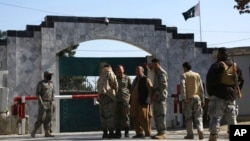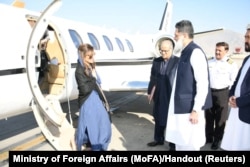The Islamic State group said Saturday it was responsible for a Friday assassination attempt on Pakistan’s chief diplomat in Afghanistan amid renewed U.S. concerns the country's Taliban rulers are not able to tackle the terrorist threat.
Officials said Pakistani Chargé d’affaires Ubaid-ur-Rehman Nizamani was on a routine afternoon walk inside the sprawling embassy compound in Kabul when unknown gunmen opened fire on him from a nearby building. He escaped unhurt, but his Pakistani security guard was hit in the chest and both legs by bullets.
The Islamic State group’s Saturday statement claimed that two members of its regional affiliate, known as Islamic State Khorasan Province, or ISIS-K, armed with “medium weapons and snippers” had assaulted “the apostate Pakistani ambassador and his guards.”
Pakistan has condemned the attack, demanding the Taliban bring the perpetrators to justice and boost security of its missions in Afghanistan.
Pakistan's Foreign Affairs Ministry said Sunday it was “independently and in consultation” with Taliban authorities verifying reports that ISIS-K had carried out the failed assassination attempt.
ISIS-K worries US
The militant claim came on the same day U.S. National Intelligence Director Avril Haines warned that ISIS-K is listed among top several terrorist groups that could pose a threat to the United States.
“ISIS-K is a concern and that is one that we are working to ensure that it does not become more of a concern,” Haines told the 2022 Reagan National Defense Forum in Simi Valley, California, Saturday.
"It’s largely focused on the Taliban right now and we are seeing the Taliban attempt (to combat ISIS-K). But frankly they really don’t have the capability to go after it the way obviously we do. That’s something we will continue to try to manage,” she said.
The Taliban have killed and captured dozens of ISIS-K members in Kabul and elsewhere in Afghanistan since returning to power, claiming they have significantly diminished the terror threat.
But ISIS-K has carried out bombings in the capital in recent months, killing hundreds of people, including top Taliban clerics and members of the Afghan minority Shiite community.
A police spokesman in Kabul said one suspect had been arrested and two weapons seized shortly after the shooting on the Pakistani embassy.
“This notwithstanding, the terrorist attack is yet another reminder of the threat that terrorism poses to peace and stability in Afghanistan and the region,” the Pakistani foreign ministry said Sunday. “We must act resolutely with all our collective might to defeat this menace,” added the ministry in its statement.
U.S. Chargé d’affaires Karen Decker of the U.S. mission to Afghanistan said on Twitter she was outraged at the attack on her Pakistani counterpart.
“I am grateful he is safe & wish a quick recovery to the brave security guard who was injured. I join the call for a swift, thorough and transparent investigation,” Decker wrote.
Taliban Foreign Affairs Minister Amir Khan Muttaqi condemned the attack in a telephone conversation with his Pakistani counterpart, Bilawal Bhutto Zardari, late Friday.
“FM Muttaqi assured him that special attention will be paid to the security of the embassy and full efforts will be made to identify and prosecute the perpetrators of the terrorist attack,” said an Afghan foreign ministry statement.
Pakistan and the world at large do not formally recognize the Taliban government.
Several countries, including Pakistan China, Russia, Turkey, Iran, India have kept their embassies in Kabul open after the Islamist Taliban seized power last year. But the United States and other Western nations immediately moved their diplomatic missions out of Afghanistan and currently operate from Qatar.
In September, an ISIS-K suicide bomber blew himself up at the entrance to the Russian embassy in Kabul, killing six people, including two Russian staff.
The latest attack targeting a foreign mission in the city has raised questions about the Taliban government’s ability ensure the security of foreign diplomatic missions in Afghanistan.





